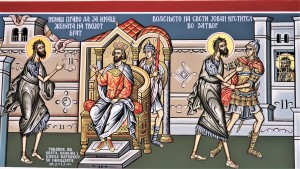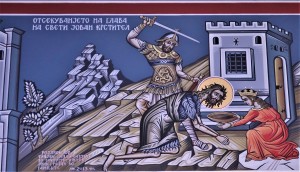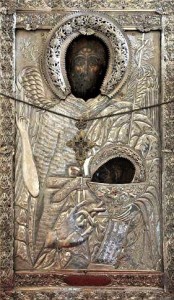Metropolitan Naum: SAINT JOHN THE BAPTIST
In today’s Gospel reading (Matthew 14, 1-12) it is revealed to us what the main human passions are and what are their basic mutual influences in us. Passion is painful – to the debauchery of the soul, which through repentance (change-of mind) should be transfigured into virtue. The main human passion is self-love, which we need to transfigure into love for God and love for mankind.
In Herod the tetrarch we recognise the passion of self-love in all its three manifestations or sub-passions: gluttony (lust, corporal pleasures), covetousness, and vainglory (love for human power and glory).
At St. John’s of the Ladder texts we read that the passions sometimes oppose each other, that is, one passion at a given moment suppresses the other. Thus, in King Herod we see that these three passions do not have the same intensity and power at the same time, and we see how the stronger passion suppresses the weaker one.
Namely, at the moment when the daughter of Herodias dances and satisfies his passion of gluttony (lust) with her dance, Herod is ready to give her half of the kingdom that belongs to him. So, the passion of lust at that moment suppressed the passion of covetousness in him. Furthermore, we see that precisely because of his passion of lust, Herod keeps St. John in prison, because he rebuked him for taking his brother’s wife. In spite of everything, neither the passion of lust nor covetousness impelled him to kill St. John, but only to keep him imprisoned, although he still respected him in some (his own) way and wanted to listen to him.
In spite of everything, neither the passion of lust nor covetousness impelled him to kill St. John, but only to keep him imprisoned, although he still respected him in some (his own) way and wanted to listen to him.
But after king Herod promised the girl and gave her his word (oath) that he would give her everything she wanted, even half of his kingdom, she, instructed by her mother, seeks the head of St. John the Baptist.
Although Herod was saddened by that, we still see that his passion of vainglory does not allow him to withdraw the word (oath) that he gave in front of the guests. Obviously, most of all Herod holds to his word, to his own self, to his pride and high opinion of himself. So, his vainglory and pride killed St. John the Baptist, that is, they finally killed the repentance in himself.
 Similarly, we, with our covetousness and corporal passions, spoil our repentance, in the way that we keep it closed (imprisoned) and suffocated somewhere within us. On the other hand, with our vainglorious and proud mind we kill the repentance, which is given to us as the greatest gift in Christ the God-Man, in the Church.
Similarly, we, with our covetousness and corporal passions, spoil our repentance, in the way that we keep it closed (imprisoned) and suffocated somewhere within us. On the other hand, with our vainglorious and proud mind we kill the repentance, which is given to us as the greatest gift in Christ the God-Man, in the Church.
To conclude – the strongest passion that kills the repentance in us is the vainglory, i.e. the pride of the mind. On the other hand, instead of transfiguring that passion into humility, we continue to nurture it. And how do we nurture it? Well, we want to be first everywhere, we want everyone to praise, glorify and love us – just like the false prophets.
People who insult and hurt us, people who God sends in order to help us see what is the strongest passion from which we need to purify our hearts – people who are, in fact, a gift from God to us – we hate and we return evil for an “evil”. By doing so, we reject the gift of God and God’s providence for our transfiguration and salvation. Such behaviour of ours means only feeding and developing the passion of vainglory, pride, in its demonic dimensions.
Saint John the Baptist, pray to God to grant us fruitful repentance!
Metropolitan of Strumica Naum

